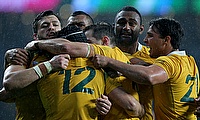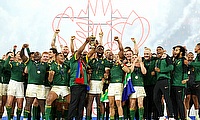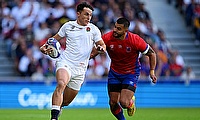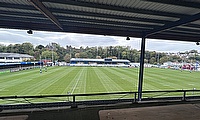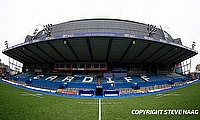Australia's unwavering defence
There were no tries, no spectacular arcing breaks from Israel Folau and George North didn’t even wear an Australian as a backpack, but Australia’s 15-6 victory over Wales at Twickenham will live long in the memory of all those who witnessed it.
The game was intense, brutally attritional and ultimately a tactically-astute feather in Michael Cheika’s coaching cap. The Australian scrum continued to turn the screw on hookers who are not the most formidable scrummagers, while the contest at the breakdown was enthralling and pendulous throughout.
There was, however, an 11-minute spell in the second half, when Australia were leading by just six points, that could yet define both teams’ Rugby World Cup campaigns.
When Will Genia was sent to the sin bin in the 56th minute for not retreating 10m, it began a quite stunning defensive effort from Australia that exhibited their remarkable fitness, discipline and defensive organisation.
From that aforementioned penalty, Wales opted to kick for the corner and attempted to make their one-man advantage count.
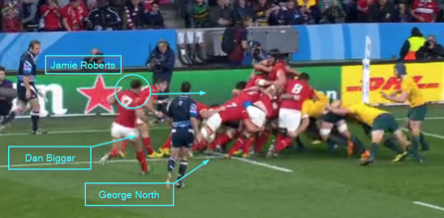
They set up the maul from the lineout and utilised one of Warren Gatland’s favoured tactics – adding backs to the maul. You can see above Jamie Roberts joining the Welsh pack and he was soon supported by his midfield companions, Dan Biggar and George North (both out of shot). Weight of numbers began to tell for Wales and Stephen Moore was pinged for swimming up the side in a successful, albeit illegal, attempt to stop the Welsh maul.
Sam Warburton opted for the corner again, lock Alun Wyn Jones took clean ball on the 5m line and Wales once again set up to push for the Australian try line.
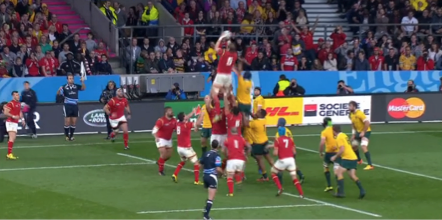
The body positions of Australia were much better in this maul than they were in the first one and they managed to push Wales a good four or five metres back. Once again, Wales sent for their backs to add weight to their maul and though they were able to regain the ground Australia had stolen from them, the result was that they were left with very few options out wide.
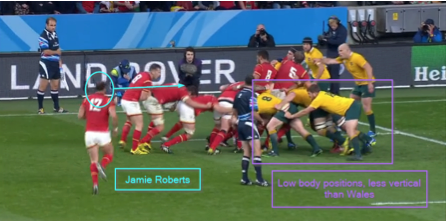
Wales strung together a few tight phases, which culminated in Taulupe Faletau crossing the try line, but the TMO ruled that he had lost control of the ball over the try line. Fortunately for Wales, the referee had been playing an advantage at the time and Wales once again kicked for the corner.
If the hope had been third time lucky for Wales, they were not to be completely disappointed, as although no try came from the lineout, the result was Dean Mumm sent to the sin bin for playing the man in the air, which left Australia with just 13 men for the next seven minutes.
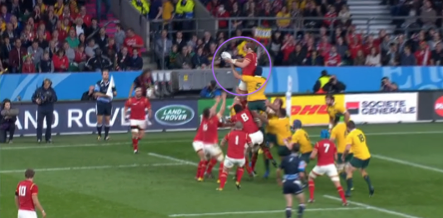
It was a soft penalty for Australia to concede, but given the proximity to the try line, the referee was given no choice but to issue Mumm with a yellow.
This sparked a change in tact for Wales, who now fancied their chances of taking on the depleted Australian scrum, despite not having had much success in that area earlier in the game.
The extra man told for Wales and they were able to get the nudge on in the scrum and started to drive it diagonally towards both the try line and touch. The scrum began to gather momentum, but instead of seeing if the forwards could see the drive through, Gareth Davies, Wales’ scrum-half, took the ball himself.
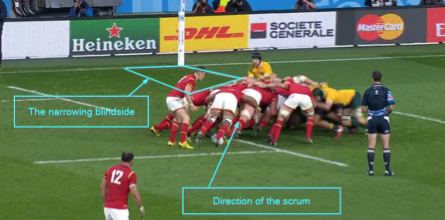
Davies attacked the blindside, with support from Liam Williams, and was confronted by two Wallaby defenders. It was a poor decision from the scrum-half as the crabbing scrum had already reduced the size of the blindside significantly and with Australia’s two-man disadvantage, there would have been a much better chance of finding space in the expanses of the openside. By running down the blindside, it played straight into the hands of the stretched Australian defence.
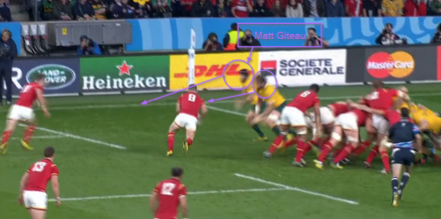
Matt Giteau resisted the temptation to commit to Davies or Williams, safe in the knowledge he had support on the inside, as well as a third defender on the outside, the touchline. Giteau was never required to make a decision as Davies ran straight at the inside defender, but had the scrum-half made the pass, the Toulon man would have been in a good position to stop any potential try.
Wales followed up this phase of play with a number of carries around the fringes, but the Australian forwards were unwavering in their defence of the gain line. Having found themselves stymied in the tight, Wales were prompted to put some width on the ball.
The Australian defence blitzed, knowing they needed to cut off the ball and force the play back inside, as they didn’t have the numbers available to stop Wales if the home nation was able to put the ball through the hands. Thanks to great line speed, the Australian blitz actually met Wales and the ball at the 22m line.
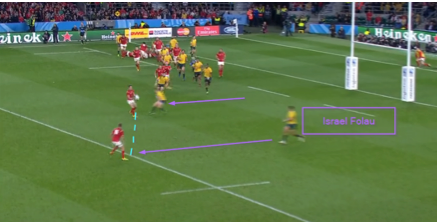
The inside blitzer put pressure on the ball-carrier, which forced a quick pass to the stationary Gareth Anscombe, and that in turn allowed Folau to eat up the ground and meet Anscombe before the Welsh full-back was able to build up any momentum.
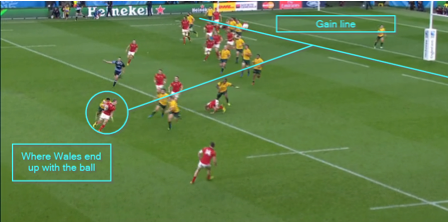
Folau actually knocked the ball on in his haste to disrupt the Welsh pass, but it forced play back outside of the 22, much to the relief of the Wallaby defenders. Advantage for the knock on was then called over for Wales just two of three phases later, with the ball still well outside of the Australian 22.
Wales rebounded quickly however, as they exposed the undermanned Australian defence with a quick switch of direction and set themselves up with a three-on-two situation out wide.
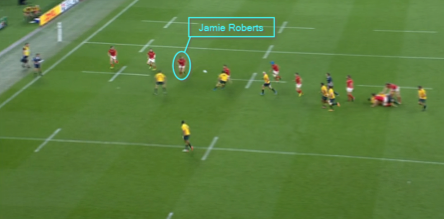
Roberts drew the last man in the defensive line with his angle, took Dan Biggar’s pass and, in one fluid motion, offloaded to the waiting Alex Cuthbert.
Cuthbert then obliged to do the same, as he drew Folau, who seemed to be Australia’s last line of defence, before he fed the ball to North and gave the winger-turned-centre what looked to be an easy run in for the try.
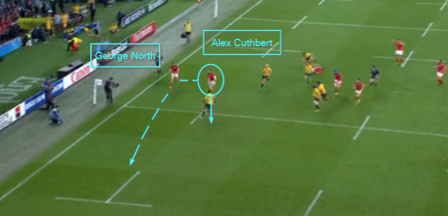
Once again however, the remarkable energy and defensive work rate of Australia rose to the surface as Bernard Foley came haring across on the cover, just managed to clip North’s ankles and the resulting stumble bought Ben McCalman the time he needed to get back and underneath North, which turned an almost certain try into a 5m scrum.
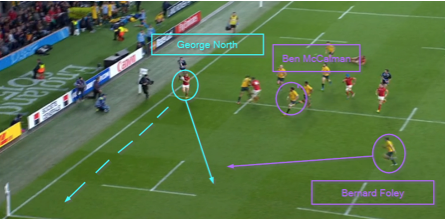
Surprisingly, North didn’t back his pace and power to finish in the corner. It’s a try we’ve seen North score time and time again, but instead he cut back inside and the work rate of Foley and McCalman was rewarded, as the pair made the try-saving tackle.
Australia then managed to buy themselves close to three minutes at the scrum with resets before Wales were able to finally get the ball in and out of the set-piece. The time was not only valuable for bringing their two men in the sin bin closer to returning, but it also gave their stretched defenders time to regroup and have a few brief moments of respite.
Unfortunately for Wales, the persistence of their half-backs to try the blindside or to switch with centres who were running back against the grain meant that almost every Welsh carry during that period was headed back into the waiting Australian defence, rather than probing for holes in the wider expanses.
Australia saved their best for last, as Adam Ashley-Cooper sprinted out of the line, caught the Welsh back as he took the ball and quickly brought him to the ground. The fresh legs of replacement Kurtley Beale also told, as the centre was the first man in and over the ball following Ashley-Cooper’s tackle and earned Australia a priceless penalty after the Welshman did not release the ball.
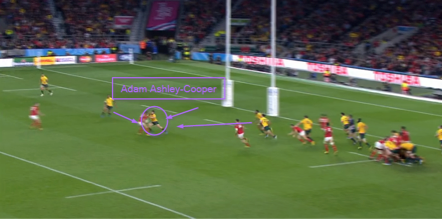
The Wallabies were then able to clear their lines, after 11 minutes of unbelievable pressure on their own try line, and, with one player still in the bin, launch their own attack. From that attack, Australia were able to kick a penalty, a tactic Wales didn’t even consider during their encampment on Australia’s try line, which enlarged the deficit and took it beyond a one-score game.
As for Wales, their lack of width damned them. On two of the three phases that Wales actually did put real speed and width on the ball, they crossed the try line, albeit for both to be held up by fantastic Australian defence.
These extraordinary 11 minutes of rugby have proven to be the difference between a quarter-final meeting with two-time winners South Africa and a Scotland side that, whilst not to be underestimated, does not carry quite the same threat as the Springboks.
It may well be that the heroic defence during that 11 minute period of Ashley-Cooper, Foley and the rest of the Australian team has given the Wallabies a traversable route all the way to the Rugby World Cup final.













